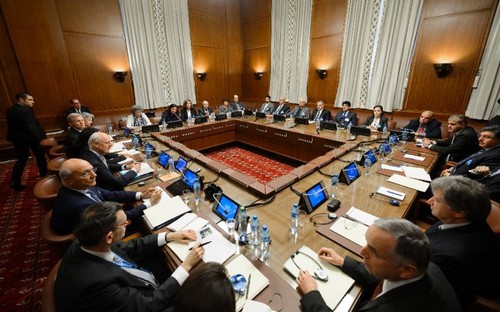(VOVworld) – The Syrian peace talks are intended to stop bloodshed in Syria. But regional tensions have threatened the talks and challenged the process.

UN special envoy Staffan de Mistura (C-L) sits facing Syria's main opposition group during Syrian peace talks at the UN Offices in Geneva on February 1, 2016 (AFP Photo/Fabrice Coffrini) |
The peace talks in Geneva aim to reach a cease-fire in Syria and create a political transition.
Unlike the previous 2 negotiations, the 3rd talks would have the participation of the Syrian oppositions. It has been delayed several times due to disagreements over participants at the talks, particularly the Kurds and the role of the anti-President al-Assad group. Hopes for a solution to end the Syrian civil war were fading when the biggest opposition group threatened to walk out. The High Negotiations Committee of the Syrian opposition group held talks with UN special envoy Staffan de Mistura to ask for humanitarian aid to towns isolated by the civil war and the government to stop bombing civilian areas and release detainees. It refused to talk with the Syrian negotiating team.
Regional tensions have cast a shadow over the Syrian talks. At least 60 people were killed and over than 100 others were injured in a string of bomb blasts on January 31st near a Shiite mosque in Damascus. Disagreements among involved parties and the tragic bombings seriously affected the talks and the Syrian people’s sentiments. Saudi Arabia’s execution of Shiite cleric Nimr al-Nirm last month has ignited anti-Saudi Arabian demonstrations in the Qatif Shiite majority region. Political analysts said Syria has been the main victim of Sunni-Shiite hatred over several decades. After the execution of cleric Nimr al-Nirm, US Secretary of State John Kerry and UN special envoy Staffan de Mistura have pledged not to allow these incidents to affect the Syrian peace talks. Meanwhile, President al-Assad has the backing of Russia and Iran to remain in his post.
The world community hopes that the Syrian parties can negotiate to stabilize the situation and reduce migration pressure on neighboring countries. More than 7.6 million people have been displaced and about 4 million more have fled to other countries.